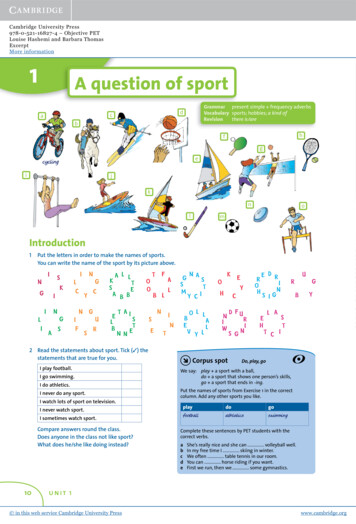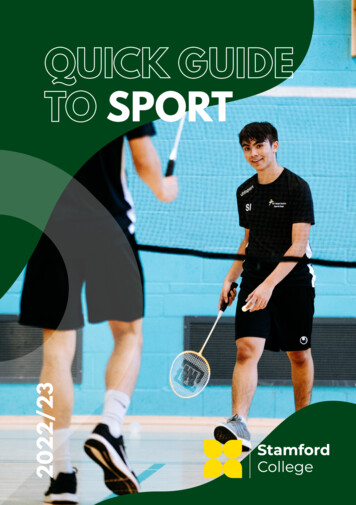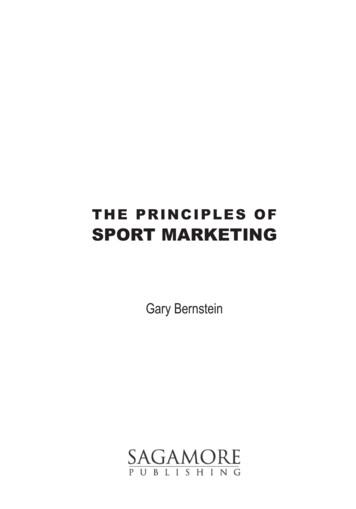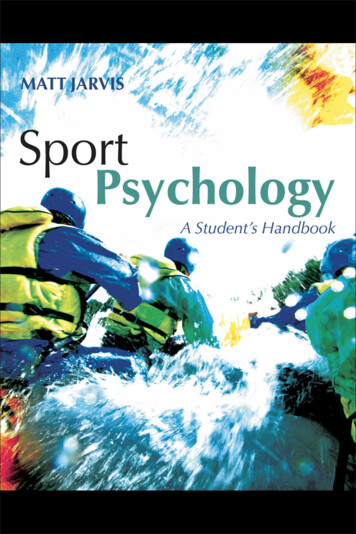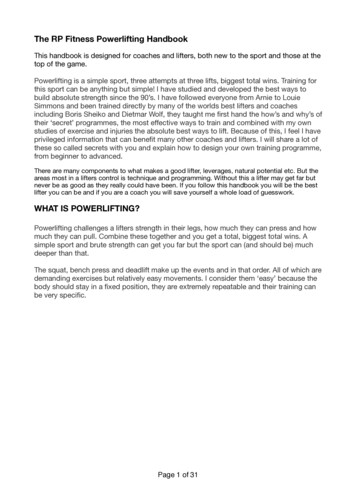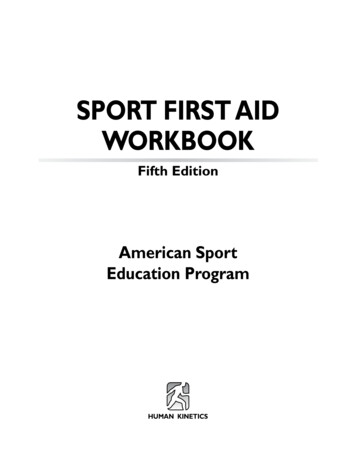
Transcription
Chapter9 Sport andchapterExercise PsychologyTuesday, October 4, 2011
Chapter9 Sport andchapterExercisePsychology9Sport and ExercisePsychologyRobin S. VealeyTuesday, October 4, 2011
What Is Sport and ExercisePsychology? Sport and exercise psychology involves the studyof human thought, emotion, and behavior inphysical activity The ABCs of physical activity– Affect: emotions– Behavior: actions– Cognitions: thoughtsTuesday, October 4, 2011
Distinction Between Exerciseand Sport Psychology Exercise PsychologyFocuses on the psychological aspects of fitness,exercise, health, and wellness Sport PsychologyFocuses on the psychological aspects ofcompetitive sport participationTuesday, October 4, 2011
What Does a Sport orExercise Psychologist Do? University professors Sport psychology service providers working inathletic programs (work with athletes andcoaches)– University– Olympic– Professional Exercise psychology service providers working inworksite health promotion or fitness businessesTuesday, October 4, 2011
Physical Activity Specialistvs. Clinical or CounselingPsychologist Physical Activity SpecialistKinesiology-trained practitioners of sport andexercise psychology focus on education or theteaching of skills to enhance the performance orpersonal fulfillment of individuals involved insport or exercise. Clinical or Counseling PsychologistsLicensed practitioners who provide psychotherapy andconsultation for individuals with clinicalconditions such as depression, phobias, or anorexianervosa. These may include athletes and exercisers.Tuesday, October 4, 2011
Goals ofSport and Exercise Psychology To understand social-psychological factors thatinfluence people’s behavior and performance inphysical activity To understand the psychological effects derivedfrom participation in physical activity To enhance the sport and exercise experience forthose who participate in physical activityTuesday, October 4, 2011
Common Uses of Knowledge ofSport and Exercise PsychologyAll professionals in kinesiology usepsychological knowledge and experience intheir jobs every day. Physical education teachers use different forms of motivationto “hook” students. Coaches motivate players and nurture strong team chemistry. Athletic trainers use psychology to help athletes recover frominjuries. Corporate and personal fitness coordinators use psychology toget people to start and continue physical activity programs. Recreational and elite sport managers use strategies foreffective leadership.Tuesday, October 4, 2011
Figure 9.2Tuesday, October 4, 2011
History of Sport andExercise Psychology Late 1800s: Norman Triplett studied the effect ofthe presence of others on bicycling performance. Coleman Griffith era 1960s: Trait personality studies were conductedrelated to sport participation and socialfacilitation or audience effects on motorperformance; national and internationalorganizations formed. 1970s: Sport psychology became a legitimatesubdiscipline; graduate programs originated;(continued)Rainer Martens pioneered the systematic study ofcompetitive anxiety in sport.Tuesday, October 4, 2011
History of Sport and ExercisePsychology (continued)Modern Sport and Exercise Psychology 1980s: Emergence of exercise psychology, thegrowth of field research, and an explosion ofapplied mental training with athletes 1990s: Growth of sport psychology and exercisepsychology subdisciplines continued, professionaltraining standards were implemented, consultingguidelines and ethical standards for exercisewere approved, and the U.S. Olympic Committeeregistry of certified professionals was created.Tuesday, October 4, 2011
Research Methods in Sportand Exercise Psychology Questionnaires: psychological inventories Interviews: in-depth, more complex responses Observations: behavior checklist or coding Physiological measures: heart rate or brain waves Biochemical measures: analyze blood or urine Content analysis: analyze written work such asactivity journalsTuesday, October 4, 2011
Overview of Knowledge inSport and Exercise PsychologySix main areas: Personality Motivation Energy management Interpersonal and group processes Developmental concerns Intervention techniques for physical activity enhancementTuesday, October 4, 2011
Personality Personality types in sportNo set of traits exists for an “athletic personality,” butsuccessful athletes possess more positive selfperceptions and use more productive cognitive copingstrategies than less successful athletes do. Personality types in exerciseNo set of traits exists for an “exercise personality,” butpersistent and consistent exercisers are more selfmotivated and confident in their physical abilities thansedentary people.Tuesday, October 4, 2011
Personality (continued) Effects of sport on personalitySport in itself does not build character; moraldevelopment and prosocial behaviors must bemodeled and created in the structure of theprogram. Effects of exercise on personalityExercise has been shown to produce severalbenefits including enhanced self-concept andpsychological well-being and decreased anxietyand depression.Tuesday, October 4, 2011
MotivationMotivation is a complex set of internal andexternal forces that directs and energizes ourbehavior (choice, effort, and persistence) insport and exercise.All humans, regardless of their individualgoals, are motivated to feel competent andself-determining.(continued)Tuesday, October 4, 2011
Motivation (continued) Intrinsic and extrinsic motivation Developing intrinsic motivation Using extrinsic reinforcers (rewards) to enhancemotivationTuesday, October 4, 2011
Figure9.3Tuesday, October 4, 2011
Motivational Processes Arousal: A state of physical and psychologicalactivation or readiness Anxiety: A negative response to a stressfulsituation characterized by apprehension andfeelings of threat Stress: A process in which individuals perceive animbalance between their response capabilities andthe demands of the situationTuesday, October 4, 2011
Energy Management in Sport andExercise Feeling states experienced by athletes and exercisers– Mental– Physical– Pleasant or unpleasant– Stress– Anxiety– Flow How energy influences performance– Unique experienceTuesday, October 4, 2011
Figure 9.4Tuesday, October 4, 2011
Interpersonal and GroupProcessesin Sport and Exercise Presence of others Group membership Leadership Aggression Gender socializationTuesday, October 4, 2011
Developmental Concerns inPsychology of Sport andExercise Physical activity in children Physical activity in older adultsTuesday, October 4, 2011
Intervention Techniquesfor Physical ActivityIntervention techniques in sport and exercisepsychology are used to increase exerciseadherence, enhance sport performance, develop lifeskills, aid in injury rehabilitation, and easecareer transitions and retirement from sport.Tuesday, October 4, 2011
Intervention Techniquesfor Physical Activity Goal setting Self-talk Attentional control and focusing Imagery Physical relaxation techniquesTuesday, October 4, 2011
Is REAL! StagesBurnout–Feelings of mental, emotional, and physical exhaustion–Negative moods and feelings (depression, despair) and a negative changein responses to other people–Lack of accomplishment–Disillusioned with involvement; occurs when personality characteristicsinteract with life stressors Adaptation and staleness Entrapment: lack of enjoyment Preventing burnout–Challenge–Variety of activityTuesday, October 4, 2011
Sport and ExercisePsychology Is A young science, developed in the last threedecades Related to sport performance, excellence, andenhancement Related to the adoption and maintenance ofphysical activity behaviors for health benefitsTuesday, October 4, 2011
Exercise psychology service providers working in worksite health promotion or fitness businesses Tuesday, October 4, 2011. Physical Activity Specialist vs. Clinical or Counseling Psychologist Physical Activity
